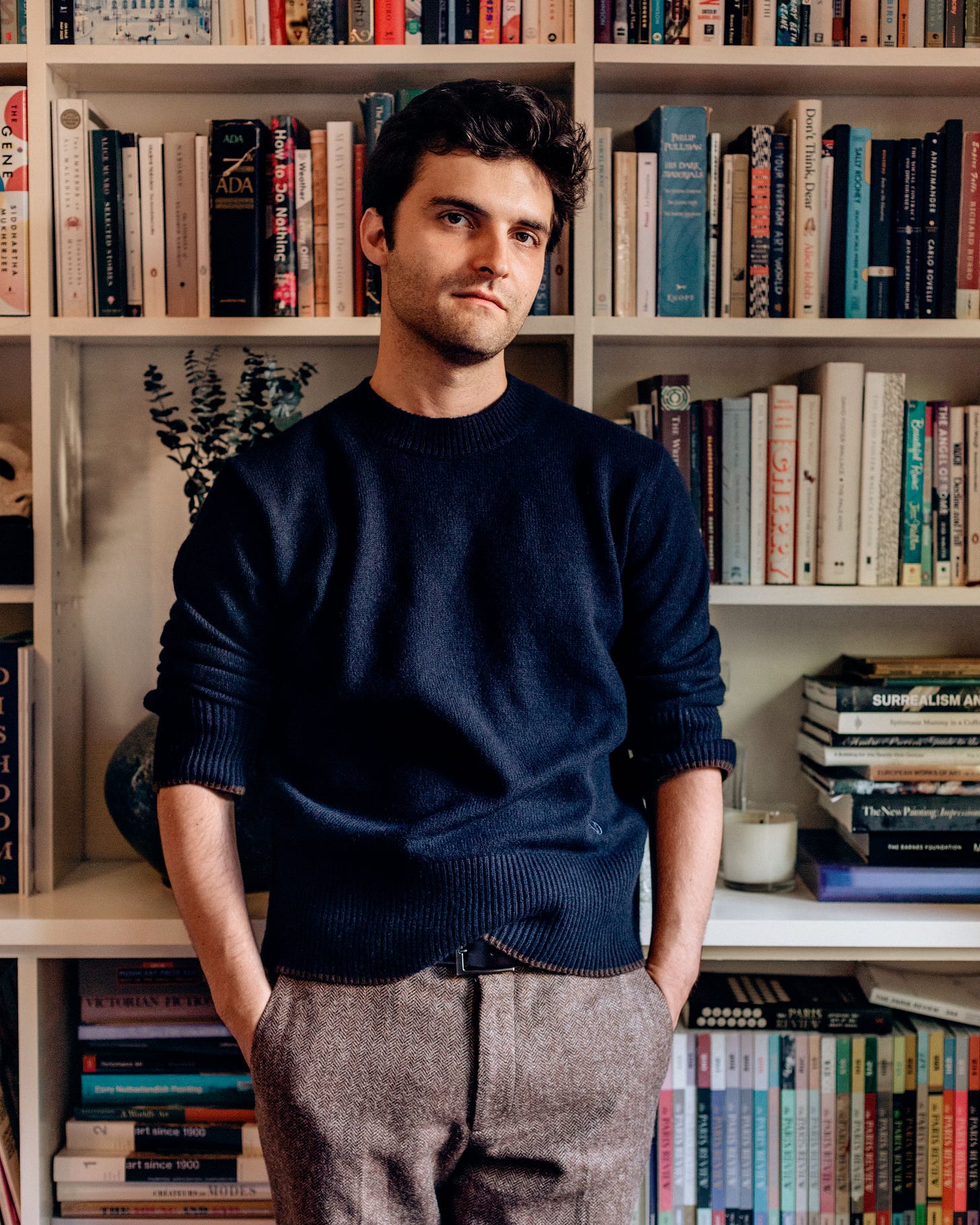Our next Candlelight Chat: How should we face loss?
This Sunday, July 21, at 1 pm ET, meet Cody Delistraty, author of THE GRIEF CURE - and read an excerpt NOW, from his new book

Dear All,
If ever you’ve experienced grief, or if ever you expect to, you really need to read The Grief Cure: Looking for the End of Loss, the magnificent new book by Cody Delistraty.
Cody, who has been named “one of the best young writers of the year,” has generously shared an excerpt from the book with us. Just scroll down this email, to read it.
*
And! We are especially fortunate that Cody will be our guest at this Sunday’s Candlelight Chat, at 1 pm ET, via Zoom. (I’ll send out the log-in info to Quiet Life members, this Saturday).
These Candlelight Chats always have an element of magic to them. As one participant described our last Chat, with author Pico Iyer: “I feel like I just witnessed and was connected to such beauty, love, insight, wisdom, peace and wholeness. I will listen to this on repeat, with such gladness in my heart.”
This Sunday, we’ll discuss questions like:
*Cody’s own story of losing his mother;
*Is chronic grief a disorder, or something else?
*Is there indeed such a thing as a “Grief Cure”?
*Is mother-loss its own special category of grief?
*Can grief be “cured” via catharsis - in Cody’s case, by writing about it, and now, talking about it?
*How grief has become largely private and repressed in the U.S. and many other countries;
*What inspired Cody to write the book;
*The state of medicine and grief (and the controversy around Prolonged Grief Disorder);
*Whether Cody advocates for any of the practices and processes he investigated while researching the book;
*How grief ultimately might be best handled;
…and much more.

And now, here’s the Prologue to Cody’s glorious new book, which you can order here:
“Seven years, eleven months, and fourteen days after my mother died, I flew from London to San Francisco to meet a neuroscientist at his Stanford laboratory. I had headed west, freed from the dreary depths of the English winter, to explore whether there might be a kind of cure for one of the oldest and most profound human emotions: grief.
Having spent years trying a variety of supposed solutions, I was ready to turn toward a fix that, in the deepest recesses of my mind, I knew to be foolish. But the speck of possibility that this neuroscientist could have the answer to the weight of my loss had me buckling in for a transatlantic flight, even as, at that point, he had little idea I was coming and even less what I intended to ask of him.
His research had been making waves in the scientific literature, and in my mind the potential of what he might be able to offer dwarfed its plausibility— the possibility of erasing memories.
My own memory fails me for much of the beginning. I remember when Mom found the lump under her clavicle. It was after dinner, at a pizza place near my dorm in Paris, where she was visiting me while I studied abroad. “It’s nothing,” she said in a reassuring voice that would slowly waver, becoming more skeptical over the next four years. Possibilities disappeared, likely treatments failed, a challenging situation became near unbearable. I remember a call from Dad the next summer. I was nineteen, back in Paris, trying to do anything to stay far away from the reality back home. “This might be it,” he said. I rang Delta, pleaded for a discount, and got back to Spokane.
Mom rallied. Almost always she did. Though her doctors were loath to put a precise timeline on it, her stage IV metastatic melanoma seemed likely to be a terminal diagnosis. Acquired perhaps from her Anglo-Germanic genetics— pale skin, blue eyes, blond hair—and decades spent in the punishing sun as a competitive swimmer, the melanoma appeared formidable. But so was she. She wanted every test, every trial, every extra day, every extra second. That meant interleukin-2 and ipilimumab in Seattle, the latter of which was then part of a cutting-edge trial. That meant an experimental tumor-infiltrating lymphocytes therapy at the National Institutes of Health in Bethesda, Maryland, as well as years of volunteering with the cancer nonprofit Swim phoning to make sure far-flung family and friends were updated on her progress and regress.
Much of this I barely remember. When I think about these moments, they are not alive with sounds and smells and transitions. They are like hastily taken photographs. A memory of the hospital bed. Of the linoleum floor. Of Dad asleep next to my mother on the couch. Of a nurse standing above her, dripping poison into her, hoping it will save her.
One night I walked out into the hospital parking lot and screamed until I cried.
In the late evening of February 27, 2014, I was in my childhood bedroom. Her life then was especially touch and go, measured not in weeks but in days, what hospice nurses call “active dying,” when there’s going to be death within 24 to 72 hours and things like oxygen levels and the quality of the skin start to notably change. It’s the stage where they tell you, “it’s time to say goodbye.” The night she died, I was two walls and several feet away. I heard quiet movements. It was around 10 p.m. when my father came to my room and asked my brother and me to report to their bedroom. We stood by her body. Then, a knock at the door—a paramedic with a body bag.
*
If the years of her illness were defined by trying to save her, much of the time since hasn’t been shaped by as clear an objective. I have tried and failed to grasp grief ’s slippery contours. I go over my mother’s final years in my head, both trying to remember them exactly right and trying to forget them entirely….I too found I remembered well a given event’s beginning and ending— arriving at the hospital, then leaving the hospital— but the middle, where the action took place— the treatment, the pain, the hobbling to the bathroom— often became fuzzy.
Dad went to counseling for a while at the church we had attended. My brother returned to college in California. I finished up university, too, and eventually flew back to Paris with the non-plan of writing, about what I didn’t know, but wanting, more than anything, to be where Mom had last been healthy.
From the moment she was diagnosed, we had plans. We acted; we hoped; we prayed; and we strategized her recovery. We sat with doctors, scheduling every aspect of her treatment, filling up dozens of oversize yellow legal pads. Our family’s type A desire to plan lent a sense of control.
But when she died: nothing. The expertise dried up. There was no control to exert. No blueprint to follow. Most grieving people are instructed to get a move on. Get the memorial planned, get on with your life. “As soon as someone dies, frenzied construction of the future (shifting furniture, etc.): futuromania,” the theorist Roland Barthes wrote in his diary two days after his mother, Henriette, died.
I wondered whether anyone really knows what to do after a loss. I had enough sense to recognize there must be a better way than ignoring it, literally flying away from it, but I wasn’t sure what that might be. Everywhere there are futile attempts at dealing with our grief, misunderstandings that have come to define the experience. Over the first few years, I tried several things I’d been told about grief, that I’d heard in music and movies and read in bestselling books: I told myself I “accepted” it, tried to get through the “five stages.” I figured I might eventually forget about what had happened. I hoped to achieve that elusive notion of closure, where grief disappears in the rearview mirror.
That this was all I knew about grief seemed pathetic in the most literal sense of the word—evoking pathos, emotion. (Another, less common translation of the Greek páthos: suffering.) It was sad how little I knew, painful even. Worse too was that this was perhaps all most people know about grief. Something devastating occurs and we run through a premade script that doesn’t comfort, has never really. Instead, at its best, it merely pushes the grief down into a place where we can continue on, perhaps barely, though often not at all…” - Cody Delistraty, from THE GRIEF CURE: Looking for the End of Loss
*
I’m really looking forward to seeing you all on Sunday.
*In the meantime, what questions do YOU want to ask Cody? (As usual, you’ll be able to ask them either via the written Chat, or live on camera.) But you can start by asking them in the comments section below!
*I’d also love to know in general your thoughts on this topic.



Loss has been my constant companion with each decade delivering its own timely blow. Recover. Lose. Recover. Lose. That was the pattern for decades. When my husband died in 1996 I learned four things that I then and now share with others who lose someone in that innermost circle of love.
1. Grief is exhausting. Sleep when you need to even if just after you eat breakfast.
2. Accept every invitation. The distraction is a blessing and it makes friends and family feel better to be able to do something.
3. Tell your story as often as you need to until you don't need to tell it anymore. And this has the added benefit of helping loved ones feel useful.
4. Grief has its own timeline. It is different for everyone. It cannot be rushed, no matter what anyone else might suggest or imply. Perhaps they have never experienced your particular loss and have no idea it is a far greater, deeper, more visceral feeling than the momentary limited emotional imagination can offer.
5. Last, and most important, be gentle with yourself. This is the no-regrets-zone of knowing we can all do more of some things and less of others. The zone of knowing we are not perfect. The zone of knowing there is nothing to do now but live life going forward and bringing into it the wisdom and compassion that is the gift to share with others.
It is small consolation that our loved ones become our ancestors. We want them physically present not just a felt presence. The task for me has been to dial up my antennae so that I don't miss their subtle but recognizable messages in whatever way they show up. I've learned that their love lives on.
I lost my daughter to cancer March 9th, 2024 at about 8:00 AM. She was only eleven. I am not ready to let go of my grief as currently I have accepted it as my daily companion, sending me messages from my darling daughter. The pain is immense and I assume I will carry it to the end of my days. However, she was a gentle quiet soul, and she told all of us that we had to carry on, being our silly beautiful selves, to be grateful and not take life for granted. So.. in memory of my girl, I keep going in honor of her wishes and because she is right, there is so much beauty and love in the world. I am grateful for every breath I am given.